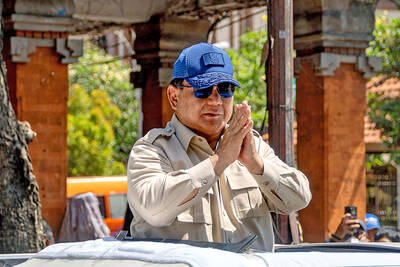A US federal court threw out the case against an American lawyer once linked to the Madrid train bombings, and the FBI apologized for a fingerprint-identification error that led to his arrest.
The court's action lifts a cloud of suspicion that has surrounded attorney Brandon Mayfield since his arrest May 6. The 37-year-old convert to Islam sharply criticized the government after the announcement, calling his time behind bars "humiliating" and "embarrassing" and saying he was targeted because of his faith.

PHOTO: AFP
"I am a Muslim, an American, and an ex-officer of the US military," he said at a news conference on Monday. "I believe I was singled out and discriminated against, I feel, as a Muslim."
FBI officials, speaking on condition of anonymity, had said that Mayfield's fingerprint matched one found on a bag of detonators near a train station in Madrid in the March 11 commuter train bombings, which killed 191 people and injured 2,000 others. But last week, Spanish authorities said the fingerprints of an Algerian man were on the bag.
"The FBI apologizes to Mr. Mayfield and his family for the hardships that this matter has caused," the bureau said in a statement issued from Washington.
Robert Jordan, the FBI agent in charge of Oregon, said the bureau would review its practices on fingerprint analyses.
Jordan said the FBI's initial determination about Mayfield's fingerprint was "based on an image of substandard quality."
Mayfield, a former Army lieutenant, was released from custody last week after the fingerprint announcement by Spanish officials. But he was not altogether cleared of suspicion at the time; the government said he remained a "material witness" and put restrictions on his movements. Those restrictions were lifted on Monday.
A statement posted on the US District Court's Web site said: "Due to the misidentification by the FBI of a fingerprint, the court orders the material witness proceeding dismissed. The court orders all property seized to be returned to the material witness."
Furthermore, the court said that all documents in the case would be unsealed.
Karin Immergut, the US attorney in Oregon, denied Mayfield had been a target because of his religion and maintained that the FBI had followed all laws in the case.
Steven Wax, the public defender who represented Mayfield, said Mayfield may sue the government.
Lawyers for Mayfield also said they would call for an investigation into leaks to the media in the case, as well as a probe into FBI actions.

DEADLOCK: Putin has vowed to continue fighting unless Ukraine cedes more land, while talks have been paused with no immediate results expected, the Kremlin said Russia on Friday said that peace talks with Kyiv were on “pause” as Ukrainian President Volodymyr Zelenskiy warned that Russian President Vladimir Putin still wanted to capture the whole of Ukraine. Meanwhile, US President Donald Trump said that he was running out of patience with Putin, and the NATO alliance said it would bolster its eastern front after Russian drones were shot down in Polish airspace this week. The latest blow to faltering diplomacy came as Russia’s army staged major military drills with its key ally Belarus. Despite Trump forcing the warring sides to hold direct talks and hosting Putin in Alaska, there

North Korea has executed people for watching or distributing foreign television shows, including popular South Korean dramas, as part of an intensifying crackdown on personal freedoms, a UN human rights report said on Friday. Surveillance has grown more pervasive since 2014 with the help of new technologies, while punishments have become harsher — including the introduction of the death penalty for offences such as sharing foreign TV dramas, the report said. The curbs make North Korea the most restrictive country in the world, said the 14-page UN report, which was based on interviews with more than 300 witnesses and victims who had

COMFORT WOMEN CLASH: Japan has strongly rejected South Korean court rulings ordering the government to provide reparations to Korean victims of sexual slavery The Japanese government yesterday defended its stance on wartime sexual slavery and described South Korean court rulings ordering Japanese compensation as violations of international law, after UN investigators criticized Tokyo for failing to ensure truth-finding and reparations for the victims. In its own response to UN human rights rapporteurs, South Korea called on Japan to “squarely face up to our painful history” and cited how Tokyo’s refusal to comply with court orders have denied the victims payment. The statements underscored how the two Asian US allies still hold key differences on the issue, even as they pause their on-and-off disputes over historical

CONSOLIDATION: The Indonesian president has used the moment to replace figures from former president Jokowi’s tenure with loyal allies In removing Indonesia’s finance minister and U-turning on protester demands, the leader of Southeast Asia’s biggest economy is scrambling to restore public trust while seizing a chance to install loyalists after deadly riots last month, experts say. Demonstrations that were sparked by low wages, unemployment and anger over lawmakers’ lavish perks grew after footage spread of a paramilitary police vehicle running over a delivery motorcycle driver. The ensuing riots, which rights groups say left at least 10 dead and hundreds detained, were the biggest of Indonesian President Prabowo Subianto’s term, and the ex-general is now calling on the public to restore their